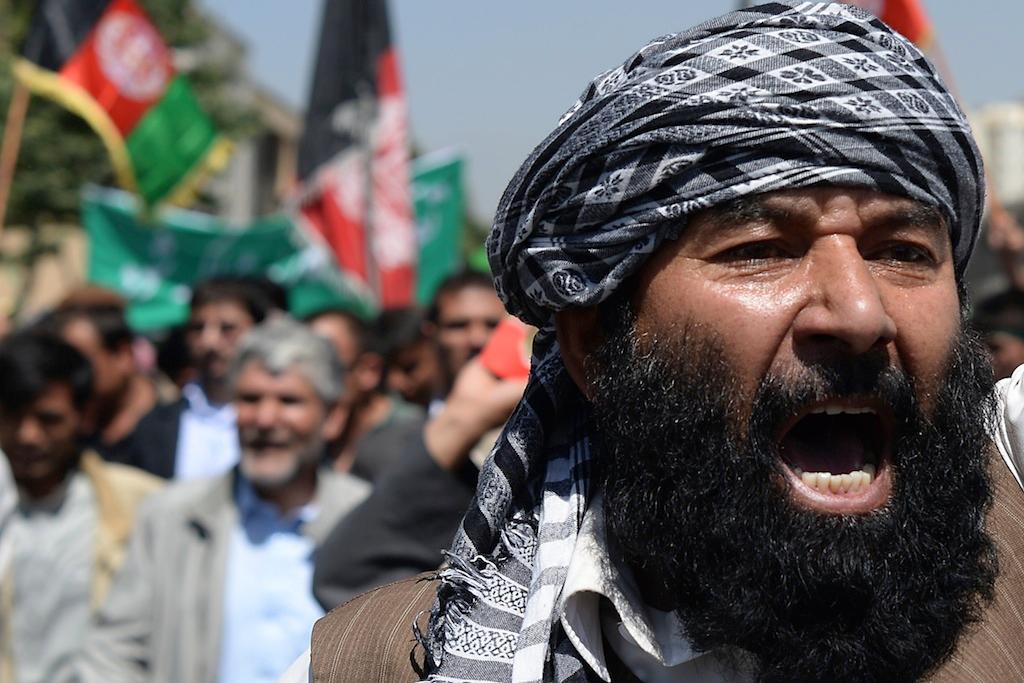Amid election protests, Afghans wary of ethnic conflict
Supporters of Afghan presidential candidate Abdullah Abdullah shout slogans during a demonstration in Kabul on June 27, 2014. Afghan presidential candidate Abdullah Abdullah led thousands of demonstrators at a noisy rally through Kabul on June 27, upping the stakes in his protest against alleged election fraud that has triggered a political crisis.
KABUL, Afghanistan — A dispute over recent elections is raising fears of a return to ethnic infighting in Afghanistan, where supporters of one disgruntled candidate on Friday staged the largest protests yet in a weeklong series of demonstrations.
Chanting, “our vote is our honor” as a call to rally, thousands of supporters of presidential hopeful Abdullah Abdullah marched from early morning to gather in a downtown avenue housing ministries and the president’s palace.
After the June 14 election, Abdullah, the widely presumed frontrunner, accused the country’s election commission of rigging the vote in favor of his opponent, Ashraf Ghani. Abdullah also asserted that Hamid Karzai had helped tamper the vote, triggering outrage at the outgoing president.
“Karzai must know he is nothing in front of the people. We want the government to be selected by the people,” said Mohammad Nadim, a protester. “We want our rights, we want prosperity for Afghanistan.”
The protests, so far peaceful, are threatening the legitimacy of what could be Afghanistan’s first democratic transition of power. They also stir anxiety among people who fear a return to the ethnic infighting that has marred Afghanistan in the past.
In the first election round in April, a majority of Afghans voted for a ticket they considered part of their own ethnic group. So while most Pashtuns voted overwhelmingly for Ghani, Abdullah, who is of mixed Tajik and Pashtun ethnicity, mustered almost unanimous support from the Tajik, as well as the Hazara population. Under the flurry of fraud allegations, the same ethnic divides have begun to surface.
“Unfortunately, the elections have accelerated the ethnicization of the country,” says Aslam Jawadi, founder of Daily Open Society, a reformist Kabul newspaper.
Leading up to Friday’s protest, Abdullah’s team arranged marches to begin from both Tajik and Hazara neighborhoods of Kabul. But while actively mobilizing protesters along ethnic lines may be an efficient tactic, it could also turn out to be a reckless one.
“[Abdullah] is getting a lot of behind the scenes advice and warnings about what could happen,” says Christine Roehrs of the Kabul-based Afghan Analysts Network (AAN). “There’s a lot of mitigating going on behind the scenes,” she said. “But his team is also very emotional at the moment.”
In a procession in the wealthy Wazir Akbar Khan neighborhood, protesters waved flags of Ahmad Shah Massoud, the anti-Taliban fighter assassinated in 2001 who is lionized by many across the nation. Shouting, “Abdullah is our Massoud,” several protesters insisted that they did not wish to see Afghanistan divided.
“No, those who say such a thing want to create disunity among Afghan people,” said Nadim. “It’s not a matter of being Tajik or Pashtu.”
Indeed, although protesters seemed to be mainly Tajik, ethnic boundaries were not clear-cut.
“It’s not the case that all Pashtuns support Ghani,” said Mohammad Yosufi, a 25-year-old Pashtun protester, who nevertheless feared ethnic strife boiling over if a political solution is not found. “It might be the only way if they don’t comply with people’s wishes,” he said.
As a case in point, in the first round, Abdullah reaped double-digit percentages in several Pashtun dominated districts.
“It’s a simplified narrative that Afghans always vote along ethnic fault lines,” said Roehrs, of AAN. However, she added, because of intensified rallying in certain provinces before the second round, voting on June 14 seemed to reverse to more familiar ethnic patterns.
A little after 11 AM the crowd began to sway unsteadily, and moved towards an open pickup truck where Abdullah himself suddenly appeared. Abdullah, who narrowly escaped an assassination attempt less than a month ago, made his way through the crowd, waving and smiling.
Within a day after the June 14 vote, before any official tally, Abdullah cried foul, claiming that Ghani had been propped up by more than a million fake votes. Abdullah’s team then released an audio recording, allegedly capturing a senior election official conspiring to stuff ballots.
After Abdullah announced his boycott of the official election process, the official purportedly appearing on the tape, Zia ul-Haq Amarkhail, resigned as head of the Independent Election Committee.
Though Amarkhail maintains his innocence – stepping down “for the national interest and the sake of the election process” – protesters repeatedly shouted “Death to Kharkhail,” with a play on the Dari word for donkey.
After the resignation, Abdullah agreed to resume conversations with the election commission, but still insists on acting “in support of people’s rights,” and has continued to drum up street protests. He has also upheld his accusations against president Karzai for meddling in the process.
After a violence-ridden election, where more than half the population defied Taliban attempts to disrupt the vote, including the killing of at least 46 civilians, protesters here seemed to direct their scorn just as much at Karzai as Ghani.
“People in the presidential palace want to ignore the will of the people who have lost their fingers to protect democracy,” said Yosufi.
A preliminary count is expected early July, while the final result is slated for July 22.
Our coverage reaches millions each week, but only a small fraction of listeners contribute to sustain our program. We still need 224 more people to donate $100 or $10/monthly to unlock our $67,000 match. Will you help us get there today?
